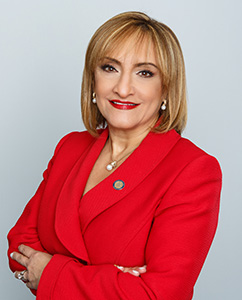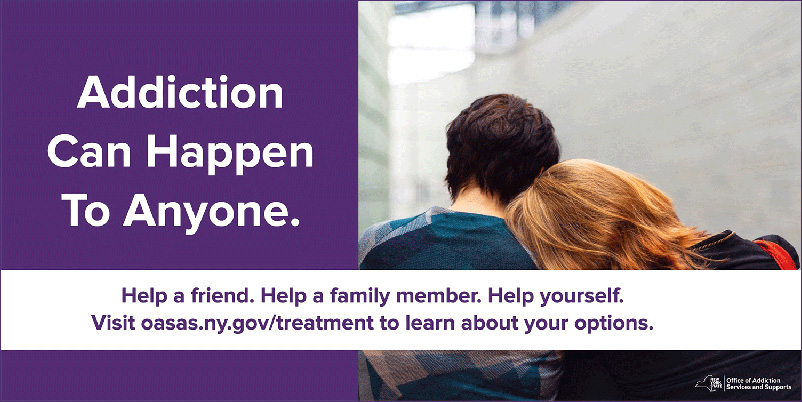Last June of 2020, Arlene González-Sánchez, LMSW, Commissioner of the New York State Office of Addiction Services and Supports (OASAS) announced a partnership with the Institute on Trauma and Trauma-Informed Care (ITTIC) at the University at Buffalo School of Social Work. The goal of the partnership was to identify key leaders in the OASAS system to be “champions” of Trauma-Informed Care (TIC).” A total of 25 champions from 13 agencies across the state, and an additional 14 OASAS central office staff were selected to participate in a 7-month TIC learning collaborative. Recognizing the pervasive impact of trauma on individuals, families and communities, OASAS sought out the learning collaborative as means of paving the way for a trauma-informed approach which mirrors the model of using universal precaution. Universal precaution positions organizations to avoid unintentional re-traumatization (activation of trauma-related survival responses in the here and now) and therefore create opportunity for interactions and environments that can promote healing and growth.

Arlene González-Sánchez
Commissioner, NYS OASAS
With the coordination of an internal OASAS Team focus on Trauma and Trauma Informed Care, ITTIC facilitated the learning collaborative from June 2020 through January 2021 based on its Trauma-Informed Organizational Change Manual, which operationalizes planning, implementation, and sustainability of trauma-informed culture change (Koury & Green, 2020). In order to participate, the champions participated in an initial kick-off training, monthly full-team consultations, agency-specific coaching sessions and a wrap-up/graduation event all via Zoom. In between training and consults, the champions completed small assignments consisting of readings, videos and written reflection to begin making connections between their agency and the ten key development areas for trauma-informed change.
The key development areas provide a flexible framework across three stages of implementation for organizations and systems to create their own tailored strategic plan that responds to unique strengths and areas for improvement. These key development areas (e.g., Leading and Communicating, Treating Trauma, Addressing the Impact of the Work, etc.) are based on synthesizing ITTIC’s research and practice, the work of Dr. Sandra Bloom (2013), Maxine Harris and Roger Fallot (2001), as well as the 10 implementation domains that the Substance Abuse and Mental Health Services Administration (2014) recommends to guide trauma-informed organizations.
Trauma is universal and a growing public health concern that organizations and systems are increasingly recognizing the need to respond to. Trauma-Informed Care (TIC) is a system-wide paradigm shift that requires agencies and systems to acknowledge the high prevalence of trauma and align individual interactions and all levels of organizational functioning with the paradigm shift of “what happened to you” versus “what is wrong with you?” (Harris & Fallot, 2001). The trauma-informed approach is the overarching umbrella that provides the framework for all individuals, organizations and systems to engage in universal precaution: to assume that individual, systemic and historical trauma is likely to be present in any given individual’s story, and thus responding to everyone in ways that prevent the possibility for re-traumatization.
“Being trauma-informed requires a commitment,” says ITTIC Co-Director Susan Green. “Individuals need to commit to acknowledge how their self and world view influences their interpretation of present moments, and organizations need to commit resources to plan and facilitate an organizational strategy to maintain a basic understanding of trauma and adversity, consider workforce health and engage in trauma-informed practices.”
The champions committed an average of 15-20 hours to learning how to use the guidelines and strategic plan for creating and ensuring a framework for trauma-informed approaches in their programs or agencies. Each month, the champions participated in learning, engaged in initial planning, and often implemented small action steps around two key development areas for trauma-informed change. The action steps in the agencies and programs represented in the collaborative often looked different.
“For example, one inpatient facility prioritized establishing a safe environment by completing a trauma-informed environment walk-through to identify possible triggers and make adjustments to create a more welcoming and safe physical space,” explains Samantha Koury, the lead ITTIC trainer of the collaborative. “Another agency focused on reviewing policies and procedures by having intentional conversations about their intake and assessment processes and rules for the youth utilizing the services. Many focused on taking steps to train the workforce by incorporating resources shared in the collaborative in staff meetings, supervision and formal training sessions they facilitated. It was truly amazing to see so many champions not only make connections between the framework and their work, but also actually take small and large steps to realize it in their agencies.”
One of the exciting things that has come out of the Collaborative is that participating providers have chosen to continue to meet and share resources and have scheduled and hosted the meetings on their own, inviting the OASAS Champions to participate, but not to facilitate the meetings. The ownership from the provider community is what will continue to move the system forward on becoming trauma informed. Internally, the OASAS “Trauma Champions” continue to meet and explore how to further move the system and OASAS forward in becoming more trauma informed. This has been helped by the leadership and support of OASAS Commissioner Arlene González-Sánchez, who knows, “Many people who use substances have experienced trauma and are often more vulnerable to ongoing trauma. This is why OASAS is committed to our work with the Institute on Trauma and Trauma Informed Care – to assist our provider system in becoming more trauma-informed in order to create opportunities for healing and person-centered care.”
Samantha P. Koury, LMSW, is Project Manager/Trainer, and Susan A. Green, LCSW, is Co-Director, at the Institute on Trauma and Trauma-Informed Care. Maria L. Morris-Groves, MSEd, is Director of Adolescent, Women and Family Services at the New York State Office of Addiction Services and Supports.
For more information about ITTIC and OASAS, please visit their websites at: socialwork.buffalo.edu/ittic and oasas.ny.gov.
References
Bloom, S. L. (2013). Creating sanctuary: Toward the evolution of sane societies. Routledge.
Harris, M., & Fallot, R. D. (Eds.). (2001). Using trauma theory to design service systems. New directions for mental health services. Jossey-Bass.
Koury, S. P., & Green, S. A. (2020). Trauma-informed organizational change manual. Institute on Trauma and Trauma-Informed Care. http://socialwork.buffalo.edu/trauma-manual
Substance Abuse and Mental Health Services Administration. (2014). SAMHSA’s concept of trauma and guidance for a trauma-informed approach. https://store.samhsa.gov/product/SAMHSA-s-Concept-of-Trauma-and-Guidance-for-a-Trauma-Informed-Approach/SMA14-4884




